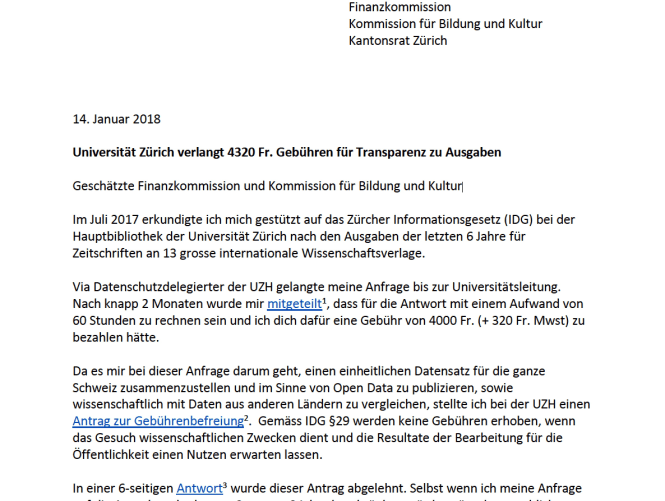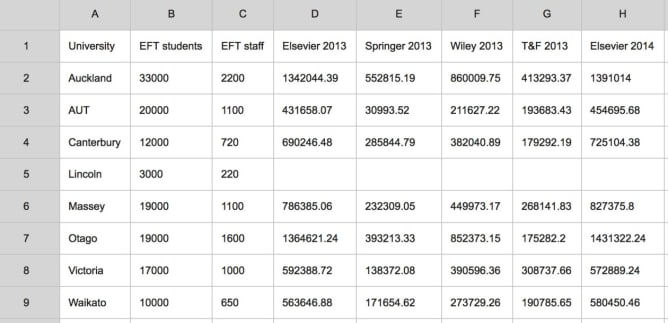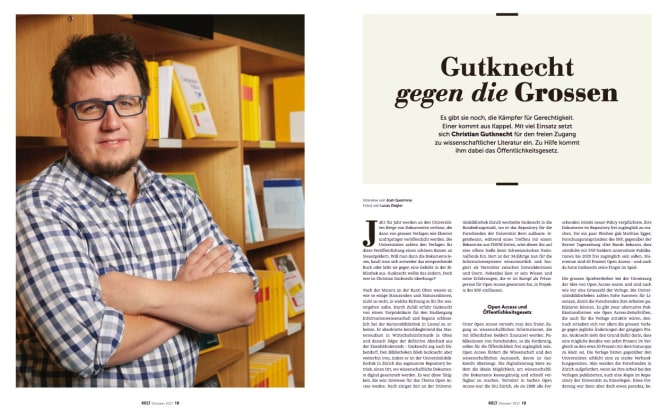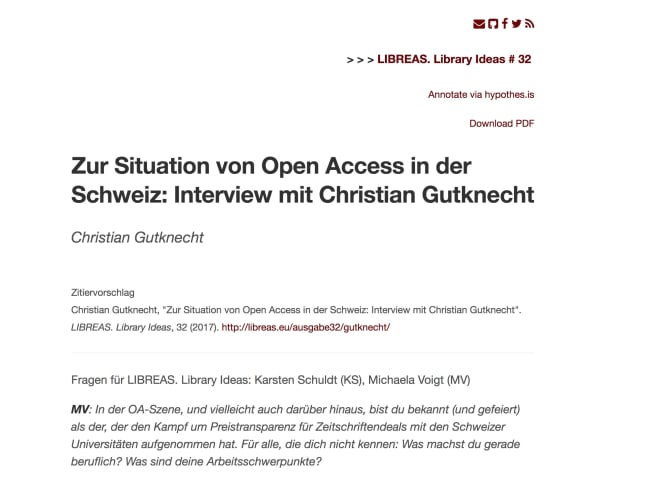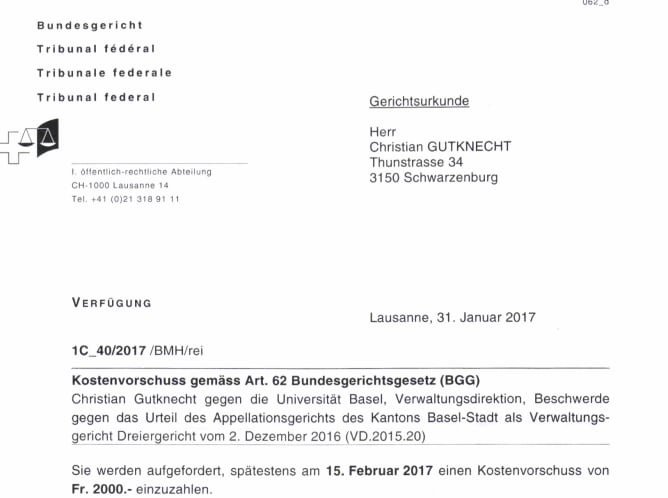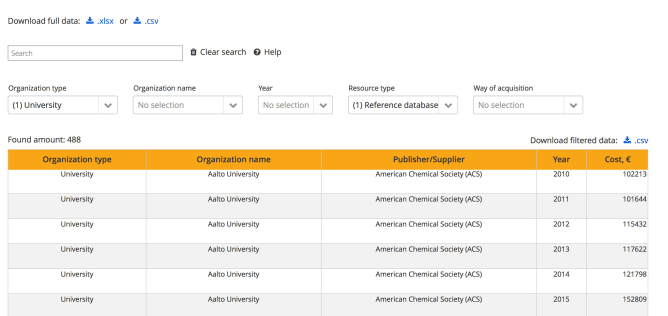Lire la mise à jour
Das Verwaltungsgericht St. Gallen hat meinen Rekurs vollständig gutgeheissen:
https://wisspub.net/2014/10/13/intransparenz-bei-den-bibliotheksausgaben-von-schweizer-hochschulen/#update_27_01_2019
https://www.tagblatt.ch/ostschweiz/uni-verliert-vor-verwaltungsgericht-ld.1088390
Lire la mise à jour

https://wisspub.net/2014/10/13/intransparenz-bei-den-bibliotheksausgaben-von-schweizer-hochschulen/#update_01_07_2018
Bemerkenswert: Der Universitätsrat St. Gallen beurteilt die 3000 Fr. Gebührenforderung der HSG Bibliothek als widerrechtlich. Ohne explizite Zustimmung des Regierungsrats kann in Kanton St. Gallen die Gebühr für die Beantwortung einer Öffentlichkeitsgesetzanfrage maximal 400 Fr. betragen.
Lire la mise à jour

Vier Jahre ist es es her, seit ich die Bibliotheken bezüglich Ausgaben angefragt habe. Zeit für eine kurze Bilanz. https://wisspub.net/2018/06/23/transparenz-bei-subskriptionskosten-in-der-schweiz-bilanz-nach-vier-jahren/
Apropos. Mein Schreiben an den Zürcher Kantonsrat bezüglich der Hauptbibliothek der Universität Zürich wurde als «Aufsichtseingabe» gewertet. Eine Antwort der ’Aufsichtskommission Bildung und Gesundheit’ und der ’Kommission für Staat und Gemeinden’ liegt nun vor: https://wisspub.files.wordpress.com/2018/05/2018-05-14-antwort-kantonsrat.pdf
Und auch in der Ostschweiz tut sich etwas. Zumindest weiss man jetzt nach zwei Jahren, dass die FH St. Gallen auch dem St. Galler Öffentlichkeitsgesetz unterstellt ist:
https://www.oeffentlichkeitsgesetz.ch/deutsch/2018/05/interkantonale-tragerschaft-schutzt-vor-transparenz-nicht/ https://www.tagblatt.ch/ostschweiz/fhs-st-gallen-muss-transparenz-schaffen-ld.1022972
Lire la mise à jour
Mark C. Wilson, Senior Lecturer an der University of Auckland hat einen Monat vor mir, die Universitäten seines Landes nach den Ausgaben für Verlage angefragt. Auch er brauchte 3 Jahre bis die Universitäten die Daten herausgeben mussten:
https://wisspub.net/2017/12/07/neuseeland-transparenz-von-subskriptionskosten/
https://theconversation.com/universities-spend-millions-on-accessing-results-of-publicly-funded-research-88392
Lustigerweise wusste ich bis vor kurzem nicht, dass jemand auf der anderen Seite der Welt etwas sehr ähnliches machte. Umso spannender war es dann in einem Video Meeting zu erfahren, dass Mark sehr ähnliche Probleme hatte wie ich.
Die Universität Zürich beharrt leider bei einer zweiten Anfrage hartnäckig auf Gebühren von mindestens 2000 Fr. Juristisch dürfte es sehr schwierig sein, solche Gebühren anzufechten. Entsprechend habe ich mich entschlossen mit einem Schreiben Kantonsräte auf die verfahrende Situation an der Universität Zürich aufmerksam zu machen: https://www.dropbox.com/s/4fapb6gyjw4hbil/2018.01.14%20-%20Schreiben%20an%20Kantonsrat-sig.pdf?dl=0
Dies inbesondere, weil demnächst eine Revision des Öffentlichkeitsgesetzes (IDG) in Zürich ansteht und im Idealfall solche absurden Gebührenforderungen dort ausgeschlossen werden. Eine ähnliche parlamentarische Initiative beim Bund ist auf gutem Weg.
Wer mich unterstützen mag, kann gerne die bei den Kantonsräten auf die Wichtigkeit einer solchen Gesetzesänderung nachdoppeln:
Finanzkommission: https://www.kantonsrat.zh.ch/organisation/Kommissionen.aspx?GruppeID=75bbd727-d9a2-46df-9d8b-72f0299914e1
Kommission für Kultur und Bildung: https://www.kantonsrat.zh.ch/organisation/Kommissionen.aspx?GruppeID=7aa00f41-85cb-4a2d-bd87-561657da3f54
Desweiteren ist sehr erfreulich, dass der SNF bekannt gegeben hat, seine geförderte Forschung soll bis 2020 100% Open Access sein: http://www.snf.ch/de/fokusForschung/newsroom/Seiten/news-171213-snf-forschung-wird-100-prozent-open-access.aspx
Und noch zweit Literaturhinweise:
Porträt KOLT: https://issuu.com/kolt/docs/kolt_10_2017_web/18
Interview Libreas: http://libreas.eu/ausgabe32/gutknecht/
Lire la mise à jour

Hallo zusammen
Inzwischen habe ich das enttäuschende Bundesgerichtsurteil verdaut. Hier eine kurze Aufarbeitung davon: https://wisspub.net/2014/10/13/intransparenz-bei-den-bibliotheksausgaben-von-schweizer-hochschulen/#update_13_08_2017
Insgesamt glaube ich nicht, dass das Urteil nun einen negativen Effekt auf andere Kantone haben wird. Auch wenn mir ein unterstützender Anwalt mitteilt, dass das Urteil für eine Abweisung doch recht umfangreich ausfällt, scheint mir das Urteil dann wieder zu ungenau um in anderen Fällen tatsächlich relevant zu werden. Insbesondere die Frage nach dem Geschäftsgeheimnis wurde recht oberflächlich - und wie ich meine im Widerspruch zu anderen bisherigen Entscheiden des Bundesgerichts - beurteilt. Dies ist auch dem Basler Datenschützer Beat Rudin so aufgefallen: https://www.bzbasel.ch/basel/basel-stadt/das-gericht-hat-entschieden-uni-darf-zu-verlagsdeals-schweigen-131564402
Ich werde Basel nun vorerst bei Seite lassen und mich endlich auf die Aufbereitung (und inzwischen schon notwendigen Aktualisierung) der erhaltenen Daten konzentrieren.
Bei Springer habe ich nun erstmals überhaupt die Daten aufbereitet und sie mit den Niederländischen vergleichen: https://wisspub.net/2017/08/14/schweiz-springer-open-access-agreement-ab-2018/
Die Daten zeigen sehr deutlich, was ich schon immer vermutet hatte. Die Schweiz zahlt mit 3 Mio. CHF etwa gleich viel für Springer-Zeitschriften-Abos wie die Niederlanden, obwohl NL bevölkerungsmässig doppelt so gross ist wie die Schweiz.
Die Zahlen zeigen zudem, dass die bisherigen Ausgaben für Springer ausreichen um Gold OA für Schweizer AutorInnen zu decken. Die anstehende Neuverhandlung der Springer-Lizenzen für 2018 wird zeigen, ob es Schweizer Hochschulen und ihre Bibliotheken es endlich verstehen, mit Steuergelder verantwortungsvoll zum Wohle der Wissenschaft und Gesellschaft umzugehen und nicht nur einfach den für sie bequemen Weg zu gehen.
Es freut mich sehr, dass Matthias Egger, der neue SNF Forschungsratspräsident, hinsichtlich Open Access ebenfalls eine grosse Ungeduld verspürt (ich konnte mich davon schon im persönlichen Gespräch überzeugen) und sich beim SNF stark für Open Access einsetzt: https://www.tagesanzeiger.ch/wissen/medizin-und-psychologie/Kaempfer-fuer-eine-offene-Wissenschaft/story/18866808
Gruss
Christian
Lire la mise à jour
Hallo zusammen
Welche Zufälle es gibt. Wenige Stunden nach der Veröffentlichung der letzten News, habe ich nun das Urteil des Bundesgerichts im Falle Universität Basel erhalten: https://wisspub.files.wordpress.com/2014/10/2017-07-24-entscheid-bundesgericht.pdf
Leider wurde meine Beschwerde abgewiesen. Das Urteil des Basler Appellationsgericht ist gemäss Bundesgericht haltbar.
Gruss
Christian
Lire la mise à jour
Hallo zusammen
Ihr habt lange nichts mehr von mir gehört. Deshalb hier mal wieder ein ausführliches Update.
UNIVERSITÄT BASEL - BUNDESGERICHT
Ich habe gegen den Entscheid des Appellationsgericht Basel-Stadt - letztlich doch - ohne Anwalt - Beschwerde beim Bundesgericht eingereicht. Die Chancen sind klein, doch ich konnte es zu diesem Zeitpunkt einfach nicht lassen.
Das Appellationsgericht Basel-Stadt argumentierte mit zwei Punkten gegen Transparenz:
-
Es besteht kein überwiegendes öffentliches Interesse an den Ausgaben, bzw. das Interesse der Universität Basel die Zahlungen geheimzuhalten sei grösser.
-
Die Ausgaben seien schützenswerte Personendaten der Verlage, die ohne Zustimmung der Verlage nicht herausgegeben werden können.
Im Juli hat nun der Regierungsrat Basel-Stadt eine Revision des Öffentlichkeitsgesetzes vorbereitet (http://goo.gl/1m3gqw) welcher genau den Artikel ändern soll, auf den sich das Gericht bei Punkt 2 beruft. Das heisst, selbst wenn das Bundesgericht in diesem Punkt die Auslegung des Appellationsgerichts stützen würde, wäre schon viel gewonnen, wenn das Bundesgericht ein überwiegendes öffentliches Interesse feststellt, womit nach der wahrscheinlichen Gesetzesänderung, die Daten erneut angefragt werden könnten.
Nun heisst es aber warten. Der Schriftwechsel wurde im Mai 2017 abgeschlossen und Bundesgerichtsurteile können dauern.
UNIVERSITÄT LAUSANNE - DATEN ERHALTEN
Nach einem Schlichtungsgespräch und einer Empfehlung der Öffentlichkeitsbeauftragten des Kt. Waadt (https://wisspub.files.wordpress.com/2014/10/2017-04-20-decision-uni-lausanne-ppdi.pdf) hat mir die BCU Lausanne ihre Zahlungen offengelegt (https://goo.gl/8koJsD).
UNIVERSITÄT / FACHHOCHSCHULE ST. GALLEN
Besonders schwierig ist es im Kanton St. Gallen. Hier trifft der Unwillen der Verwaltung mit juristischem Dilettantismus zusammen.
So behauptet der Rektor und der Senatsauschuss der Universität St. Gallen (https://goo.gl/YnX1Ht), das St. Galler Öffentlichkeitsgesetz sei nicht auf Dokumente anwendbar, die vor dessen Einführung erstellt wurden. Zudem sei der Aufwand für die Zusammenstellung der Daten so hoch, dass 3000 Fr. dafür fällig sein. Diese offensichtlich falsche und widersprüchlich Argumentation wird nun durch den Universitätsrat überprüft. Der Schriftwechsel wurde im Juni 2017 abgeschlossen und es wird wohl mind. 6 Monate gehen bis ein weiterer Entscheid vorliegt.
Auch bei der Fachhochschule St. Gallen möchte man nicht transparent sein und behauptet schlicht, man sei als interkantonale öffentlich-rechtliche Anstalt nicht dem Recht des Sitzkantons unterstellt. Ohne aber zu sagen, welches Recht den sonst zu Anwendung kommt.
Siehe zusammenfassend auch die Berichterstattung über diesen Fall: -https://www.zsz.ch/obersee/die-fachhochschule-st-gallen-schwebt-ueber-dem-gesetz/story/23215767
- https://www.oeffentlichkeitsgesetz.ch/deutsch/2017/07/von-gesetzeslucken-und-fehlendem-willen/
Der Verein Öffentlichkeitsgesetz.ch unterstützt mich freundlicherweise bei dem Weiterzug, in dem er die im Kt. St.Gallen besonders happigen Rekursgebühren übernimmt.
ETH-ZÜRICH - RÜCKZUG UND WARTEN AUF GESETZESÄNDERUNG
Die ETH-Bibliothek - immer noch aufgebracht das ich mich an einer anderen Stelle öffentlich dazu bekannt habe, den «Vordenker» nicht im Direktor Rafael Ball gefunden zu haben - hielt bei der Schlichtungsverhandlung beim EDÖB an hohen Gebühren für weitere Daten fest. Letztlich stand am Ende der Schlichtung das Angebot, dass ich für eine inhaltlich reduzierte Anfrage ’nur’ noch 600 Franken zu bezahlen hätte (https://goo.gl/4B5UT4) , anstatt wie zuerst verlangt 4000 Fr. (https://www.oeffentlichkeitsgesetz.ch/deutsch/2016/07/jetzt-versucht-es-die-eth-mit-uberrissenen-gebuhren/).
Da ich aber selbst diese 600 Fr. für sachlich nicht gerechtfertigt halte, habe ich beschlossen das Einsichtgesuch zurückzuziehen und auf die Überarbeitung der Gebührenregelung zu warten, welche im Parlament bereits die Empfehlung der beiden staatspolitischen Kommissionen erhalten hat (https://www.parlament.ch/de/ratsbetrieb/suche-curia-vista/geschaeft?AffairId=20160432).
VOLLE TRANSPARENZ IN DEN NIEDERLANDEN
In den Niederlanden haben die Universitäten auf eine Anfrage von Leo Waaijers hin inzwischen nicht nur ihre Ausgaben, sondern auch die kompletten Verträge mit den Verlagen offengelegt (http://www.vsnu.nl/en_GB/public-access-request). Dies ist zusätzlich bemerkenswert, als das die Niederländer nach harten Verhandlungen tatsächlich richtungsweisende Bedingungen erreicht haben. Nicht zuletzt versuchten Elsevier und Springer die Offenlegung letztlich erfolglos zu verhindern.
THEMA AUCH IM SCHWEIZER BUNDESRAT
Die Frage wieviel die Schweizer Hochschulbibliotheken an die Verlage bezahlen und ob man sich in der Schweiz nicht ähnlich wie in den Niederlanden mehr für Open Access einsetzen könnte, wurde durch Isabelle Chevaley (GLP, VD) auch an den Bundesrat gestellt. Interpellation «Wie können wissenschaftliche Verlage davon abgebracht werden, der Gesellschaft den vitalen Zugang zu Wissen vorzuenthalten?»: https://www.parlament.ch/de/ratsbetrieb/suche-curia-vista/geschaeft?AffairId=20163930
DEUTSCHLAND NUN AUCH AKTIVER ALS SCHWEIZ
In der gleichen Zeit in der viele Schweizer Hochschulbibliotheken viel Energie damit vergeudet haben sich gegen Transparenz zu wehren, haben sich in Deutschland Wissenschaftseinrichtungen sich zum Projekt DEAL (https://www.projekt-deal.de) zusammengeschlossen. Gerade die Inhalte von Elsevier, Springer und Wiley sollen erstmals überhaupt bundesweit-lizenziert werden und ähnlich wie in den Niederlanden sollen AutorInnen der teilnehmenden Deutschen Wissenschaftseinrichtungen bei den Verlagen automatisch Open Access publizieren können. Als ersten Verlag hat man sich in Deutschland gleich den grössten (Elsevier) ausgesucht und stösst auf derzeit grossen Widerstand. Inzwischen haben knapp 80 Wissenschaftseinrichtungen die Subskription-Verträge mit Elsevier nicht verlängert (Siehe: https://www.projekt-deal.de/pressespiegel/). Ein Boykott dieses Ausmasses hat es noch geben und die Chancen sind sehr hoch, das Deutschland es zu noch besseren Bedingungen als die Niederländer schafft und somit die Transformation zu Open Access massiv voranbringt.
Gerade mit Blick auf die Entwicklungen in NL und DE ist für mich die Situation in der Schweiz nur noch schwer auszuhalten. Denn ALLE Argumente die nun über die Jahre gegen mehr Transparenz und gegen ein aktiveres Angehen von Open Access vorgebracht wurden, werden laufend durch die Aktionen im Ausland widerlegt.
Zum Abschluss dieses Updates noch zwei Presse Artikel, welche die Thematik inhaltlich aufgreifen:
- https://dennisbuehler.com/2017/01/21/open-access-schweiz-will-ruckstand-aufholen/
- https://www.lecourrier.ch/146655/les_couts_caches_du_libre_acces
Lire la mise à jour
Actually there was also a student from the University of Amsterdam who requested the same information from the Dutch Universities as I did. No university denied the access and he got all the information within 6 months. See Information here (Switzerland is also mentioned).
There was a second request not only to get access to the payment data, but also to the whole contracts between the Universities and the publishers. Elsevier and Springer are currently trying to prevent that in court.
Lire la mise à jour
The resistance in Switzerland is especially hard to understand, when you see that in Finland, the Open Science group of the Ministry of education and culture just has released a public database where you find the spendings between 2010 and 2015 to over 200 publishers from all Finnish Universities. See article here.
This inspiration from abroad, is a good inspiration for going on…
Lire la mise à jour
ar all
I hope you already got the good news about the decision of the court by a previous mail. In the mean time the verdict (anonymized / full version) has been accepted by the University of Geneva and the publishers. The University has handed over the requested data.
Having a look at the Excel sheet it feels crazy to realize, that for those few numbers an effort of more than a year and lawyer costs of about 10’000 CHF (final settlement is still outstanding) were necessary.
But I’m confident that not only the numbers alone are important for further impact, but as well the process how we got there. Going to court is fortunately not the regular way how things are handled in Switzerland. Going down that road is usually the last resort and I believe that it has demonstrated that there is something fundamentally wrong in academic publishing.
I have the impression more and more people are currently get aware and want change something about that situation. It’s great to see that not only in Switzerland things are moving, but also internationally.
There’s now the oa2020.org initiative that focus exactly on the potential of the subscription money for Open Access. There’s a fantastic new Briefing Paper from Science Europe, also taking into account the existing money from subscription for a change.
Also there are other similar initiatives like this one, in other countries.
- In Finland there was also a trial about disclosing the costs from Elsevier Books, where transparency also won. Since then an official collecting of data has begun and we hopefully will soon see the result of that.
- This month there was an article in the Guardian about the subscriptions costs in UK. It was based on an excellent paper about how less we know about the costs in this billion-sector and why we should have a public infrastructure to monitor the financial flows in academic publishing.
Things are moving slowly, but they are moving. There’s still a lot to do in Switzerland and I will use the decision from Geneva to get further data from other Swiss universities. However it’s not that easy as expected; the resistance for full transparency is still huge.
Recently also wrote a short article (in german only) about the approach for more transparency in Switzerland.
So thanks again for your help and I will get back to you when I receive the final settlement from my lawyer.
Christian
Lire la mise à jour
Hi all
I’ve just released the last part of my blog post about past events at the ETH Board.
http://wisspub.net/2016/01/14/der-eth-bereich-und-elsevier-teil-1/
In short: Back in 2010 there was a «fight» between the library directors of the EPFL and the ETHZ. The EPFL library complained about the bad conditions and some flaws in in the negotiations of the Swiss Consortium and Elsevier. The ETH-Board as superior strategic organ of the ETH Domain intervened. In order to settle the conflict, they wanted to commission external expertise in order to find out, if the negotiated license with Elsevier is best practice, and if not how they could strengthen their position against Elsevier. Interestingly they had to give up that intention. Due to signed confidentiality clauses, they were not able to show their contracts to external experts, so no external expertise was commissioned.
Interestingly – and that was totally new to me – the president of the ETH Board already requested in 2012 that in the next negotiation round with Elsevier (2014) the consortium should refrain from non-disclosure clauses:
Despite this request from an «important» position, the consortium ignored that request.
Best regards
Christian
Lire la mise à jour
Hi all
Unfortunately I’m a little behind in sharing the latest good news with you.
- I eventually got the numbers from the University of Bern and just finished to make a short analysis about that.
- After a year my appeal against the denial of access by the ZHAW as eventually approved by the Rekurskommission der Zürcher Hochschulen. I’m now waiting to recieve the numbers from the ZHAW.
- Due to this positive result in Zurich, I’ve eventually decided to publish the numbers from the University of Zurich, which I had received by a mistake a year ago. I’ve just finished writing a short analysis.
Regarding the upcoming year there is much hope for a change. Swissuniversities (the association of all Universities, incl. FHs and PHs) have been formally requested by the State Secretary Mauro Dell’Ambrogio to engage towards more Open Access.
Swissuniversities and the Swiss National Science Foundation intends also to commission an official analysis regarding the costs involved with publishing. This indeed will be independent from this private project.
Regarding the case in Geneva I unfortunately still have no news. My lawyer wrote a long final statement including the latest updates, but still no word from the court.
Best Regards and a good new year..
Christian
Lire la mise à jour
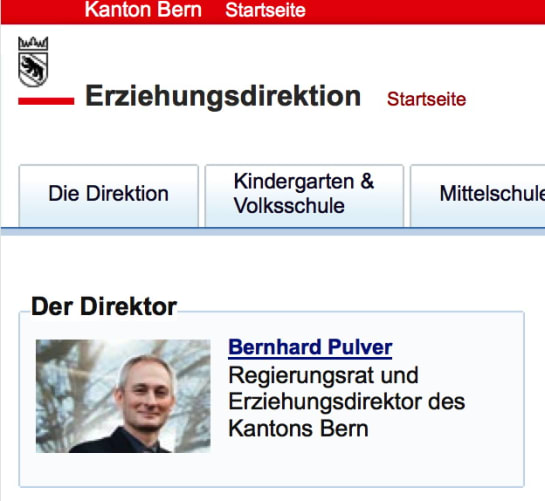
Still no news from Geneva. But good news from the canton Bern. The cantonal ministry of education, which oversees the university, has approved my appeal. The University of Bern has to disclose the prices, as the prices alone, are not classified as trade secret.
Lire la mise à jour
Hier nun auch die Zahlen der EPFL: https://wisspub.files.wordpress.com/2014/10/2015-09-18-zahlen-epfl.xls
Lire la mise à jour
Zum Anlass der Open Access Tage in Zürich, berichtet auch das SRF Wissenschaftsmagazin über den «Geldesel Wissenschaftsverlag» und hat auch mich dazu interviewt.
http://www.srf.ch/play/radio/popupaudioplayer?id=149970fa-0111-4285-ac25-fa0fe5c9aa17
Lire la mise à jour
Auch die Lib4RI hat mir ihre Zahlungen geschickt:
In der NZZ am Sonntag ist nun auch ein Artikel über die fetten Gewinne der Verlage erschienen: http://t.co/DCvrP0mJp9
Lire la mise à jour
Nach der Empfehlung des EDÖB hat mir die ETH-Bibliothek die Daten nun zugestellt. Hier meine Einschätzung dazu:
Lire la mise à jour
A year after submitting the appeal I’ve received the recommendation of the Federal Information Commissioner. He recommends the ETH, EPFL and Lib4RI to disclose the prices, as he does not recognize any valid reasons to withhold this information from the public.
Lire la mise à jour
Nach gut einem Jahr liegt nun die Empfehlung des Eidgenössischen Datenschutz- und Öffentlichkeitsbeauftragten (EDÖB) vor. Wie auch der Genfer Öffentlichkeitsbeauftragte, empfiehlt er den betroffenen drei Institutionen (ETHZ, EPFL und Lib4RI) die Offenlegung der Preise.
Lire la mise à jour
Bei Telepolis gibt es von Ulrich Herb auch einen Beitrag über dieses Transparenzprojekt:
http://www.heise.de/tp/artikel/44/44156/1.html
In der FAZ ist übrigens auch eben ein Interview mit dem Direktor der UB Leipzig erschienen. Bemerkenswert ist folgende Aussage auf die Frage wie Leipziger Wissenschaftler nach der Abbestellung aller Elsevier Journals an die Inhalte kommen: «Wir müssen tatsächlich über Dokumentenlieferdienste operieren, die einzelne Aufsätze beschaffen. Das ist umständlicher, für uns aber momentan preiswerter.»
Genau diese Möglichkeit habe ich in meinem Rekurs bei der Universität Basel auch aufgezeigt, was aber von der Rekurskommission als «in einem professionellen Betrieb wie der Universität Basel keineswegs realistisch und praktikabel» abgetan wurde.
Interessant, was für die einen eine preiswertere Realität ist, ist für die Universität Basel nicht praktikabel. Höchste Zeit, dass die Zahlen der Universität Basel öffentlich werden. Wie in vielen Kantonen wird auch auch in Basel-Stadt gerade ein Sparpaket geschnürt.
Lire la mise à jour

Inzwischen habe ich auch Rekurs beim Appellationsgericht Basel-Stadt gegen den Entscheid der Rekurskommission der Universität Basel eingereicht. Das heisst weitere Unterstützung ist gerne willkommen.
Lire la mise à jour
12 days to collect 5050 CHF. That’s really amazing! Thank you very much for your contribution and confidence!!
I will contact you about the rewards when the crowdfunding project has officially ended. At this moment I have not yet access to your contact details.
In the meantime the following general update:
Due to the deadlines in the case of the University of Geneva I already have commissioned the lawyers to write the appeal and send it to the court. Now the University of Geneva has time until 27th February 2015 to comment the appeal.
This week I also was informed that the Federal Data Protection and Information Commissioner has eventually started to work on the recommendations for the federal institutions (ETH, EPFL, Lib4RI and Swiss Consortium), which should be ready in spring.
Lire la mise à jour
Liebe Unterstützer und Unterstützerinnen,
Erstmals vielen Dank dass, sich innerhalb kurzer Zeit soviel Zussagen ergeben haben. Das freut und motiviert mich ausserordentlich!
Inzwischen wurde das Crowdfunding-Projekt auch auf auf der Plattform oeffentlichkeitsgesetz.ch erwähnt (Deutsch/Französisch).
Letzten Mittwoch wurde mir noch der ablehnende Entscheid der Rekurskommission der Universität Basel zugestellt. Die wichtigsten Punkte daraus habe ich hier zusammengefasst:
Gerade im Gegensatz zu der Empfehlung aus Genf, scheint mir der Basler Entscheid relativ unsorgfältig gemacht worden zu sein. Und das sage ich jetzt nicht nur weil der Entscheid zu meinen/unseren Ungunsten gefallen ist. So hat aber die Rekurskommission beispielsweise von der Universität Basel wohl gar keine Einsicht in die fraglichen Akten verlangt. Wie mir Beat Rudin (Basler Datenschutz und Öffentlichkeitsbeauftragter) auch eben bestätigt hat, wurde er nicht nicht um eine Stellungsnahme angefragt. Wie er sagt ist das nicht ungewöhnlich. Allerdings weiss ich dass bei noch laufenden Rekurs gegend die Verfügung der ZB Zürich, der Züricher Öffentlichkeitsbeauftragter explizit zu einer Stellungsnahme eingeladen wurde.
Insofern ziehe ich Rekurrieren gegen diese Entscheidung gerade in Erwägung..


